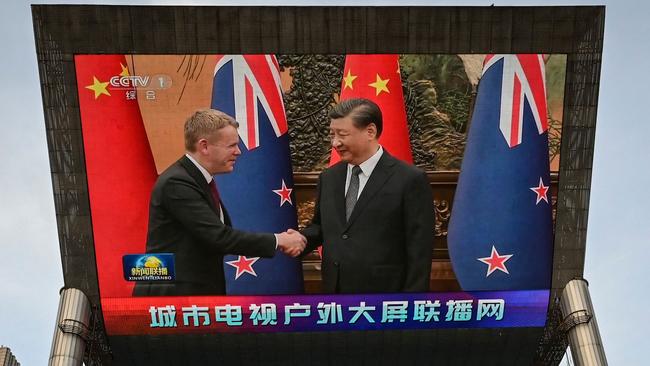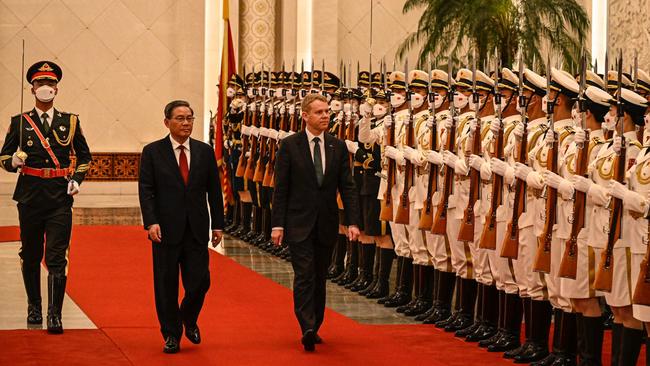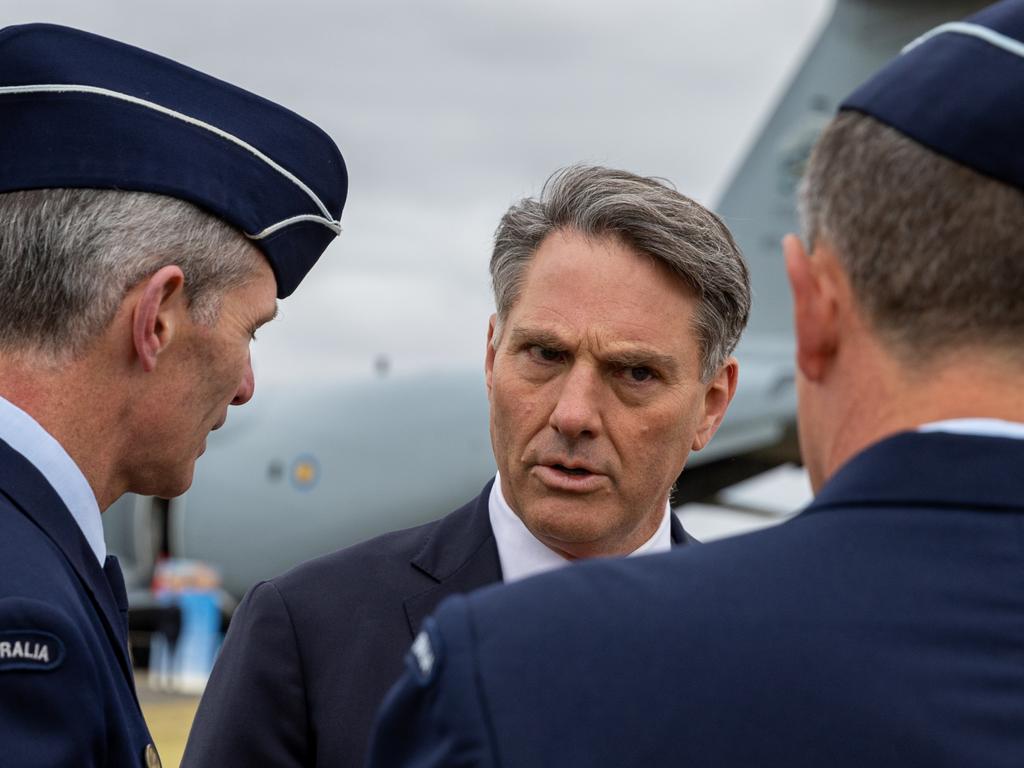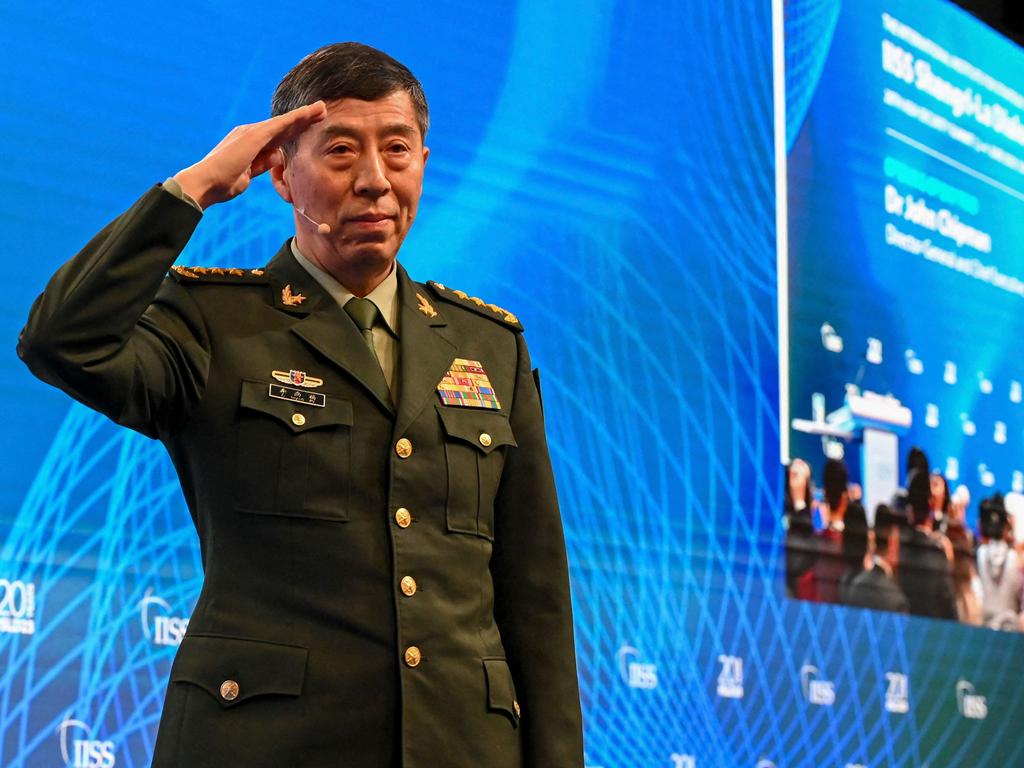New Zealand PM’s China trip unnerves Taiwan as Australia thickens security ties with Taipei
Wellington has given a ‘win’ to Beijing in the same week that Taipei has revealed it’s thickening security ties with Australia.

New Zealand Prime Minister Chris Hipkins’ trip to China has unnerved Taiwan and given a “win” to Beijing in the same week it was revealed Australia has strengthened security ties with Taipei.
Mr Hipkins on Friday left China after a trade-focused, six-day trip, which included meetings with President Xi Jinping and top officials.
Many of those in Mr Hipkins’ business delegation were thrilled with the high profile given to the trip by China’s propaganda machine. Chinese foreign ministry spokeswoman Mao Ning underscored that the endorsement came from the very top of China’s political system.
“President Xi Jinping noted that China-New Zealand relations have long spearheaded China’s relations with developed countries. It is important to carry forward that spirit, achieve more ‘firsts’ and consolidate and deepen the comprehensive strategic partnership,” Ms Mao said.
Top billing for NZ PM @chrishipkins at yesterday’s Chinese Foreign Ministry presser:
— Will Glasgow (@wmdglasgow) June 30, 2023
“Xi Jinping noted that China-New Zealand relations have long spearheaded China’s relations with developed countries. It is important to carry forward that spirit, achieve more ‘firsts…†pic.twitter.com/iDFmBfiDjn
Wellington’s top priority for the trip – held less than four months before an election at which the struggling economy is the top issue – was maintaining access for agricultural and tourist businesses, along with the country’s increasingly China-reliant education sector.
“It’s all about Chinese export dollars,” one person in the 100-plus NZ entourage told The Weekend Australian.
The chairmen of dairy and kiwifruit giants Fonterra and Zespri were in the delegation, along with vice-chancellors, tourism leaders, the CEO of Air New Zealand, and New Zealand’s trade and tourism ministers.
They were reportedly upbeat at a New Zealand embassy gathering held after Mr Hipkins’ audience with Mr Xi.
Taipei was troubled by the joint statement released by Beijing after Mr Hipkins’ Wednesday meeting with Premier Li Qiang. “The two sides reaffirmed their commitment to respecting each other’s sovereignty and territorial integrity in accordance with the UN charter. New Zealand reaffirmed its commitment to its one-China policy,” the statement read.
That language was “a breakthrough”, according to a source in the Taiwanese government, who spoke on the condition of anonymity. “Few advanced countries would use such wording.”
University of Tasmanian professor Mark Harrison, Australia’s leading expert on Taiwan, said the wording was a “win” for Beijing. “It indicates that they lent a little to Beijing,” he said.
Significant wins for Beijing over Taipei in the 🇨🇳🇳🇿 Joint Statement text:
— @mhar4 (@mhar4) June 28, 2023
"two sides reaffirmed their commitment to respecting each other's sovereignty and territorial integrity"
and "New Zealand welcomes China's application to join the CPTPP"https://t.co/v5wEV2puwppic.twitter.com/zP3m3po2nY
A spokeswoman for New Zealand’s Ministry of Foreign Affairs and Trade said similar language was used in a joint statement after a trip to Beijing in 2014 by then NZ PM John Key.
“New Zealand’s position on Taiwan has not changed. We have for five decades adhered to our One China Policy. Under this policy, we have substantial economic and cultural exchanges with Taiwan,” the spokeswoman said.
The joint statement also welcomed China’s application to join the Comprehensive and Progressive Trans-Pacific Partnership, while noting all applicants needed to demonstrate “they can meet its high standards”. Beijing has tried unsuccessfully to get Australia to make a similar declaration.

Beijing appears to have had success cultivating opposition to stall Taiwan’s application, which requires unanimous support for CPTPP members. “I think it’s going to take a long, long time to resolve the issue of China’s ascension,” Taiwanese Foreign Minister Joseph Wu told The Weekend Australian in a recent interview. “China is probably likely to get in the way to stop Taiwan’s accession to the CPTPP from being discussed.”
Taipei’s pessimism about its CPTPP application has seen it increase its advocacy for bilateral trade agreements, with Australia a priority.
In a recent interview with The Australian, Taiwan’s Foreign Minister made public its request to Canberra to exchange military attaches to improve their “information sharing”. The Australian government has declined to comment on that request. However, the Taiwanese government this week revealed a “director of strategic affairs” had joined Australia’s de facto embassy in Taipei.
Check out @wmdglasgow’s piece on @australian & hear about Minister Wu’s take on the vitality of institutionalized security cooperation between #Taiwan🇹🇼 & #Australia🇦🇺. Hostilities are avoidable when #IndoPacific democracies unite against #China’s aggression. https://t.co/C6SffG2ID0pic.twitter.com/l2p9e40B29
— 外交部 Ministry of Foreign Affairs, ROC (Taiwan) 🇹🇼 (@MOFA_Taiwan) June 26, 2023
A spokesman for Australia’s Department of Foreign Affairs said “as like-minded partners, Taiwan and Australia have regular exchanges and discussions around economic and security issues”.
“The Australian Office in Taipei works across the full range of our interests in promoting our deep and productive unofficial relationship with Taiwan, including trade and investment, people-to-people ties and regional security,” the spokesman said.
Benjamin Herscovitch, a research fellow at the ANU National Security College, said the use of “regional security” by DFAT was a “departure” from the way Canberra typically spoke about Taiwan.
“This looks like a potentially significant evolution of the way in which Canberra publicly talks about the connection between Australia’s regional security interests and its ties with Taiwan,” said Dr Herscovitch, who closely tracks Australia-China-Taiwan relations.
Read the first part of The Australian’s interview with Taiwanese Foreign Minister Joseph Wu here and the second part here.








To join the conversation, please log in. Don't have an account? Register
Join the conversation, you are commenting as Logout